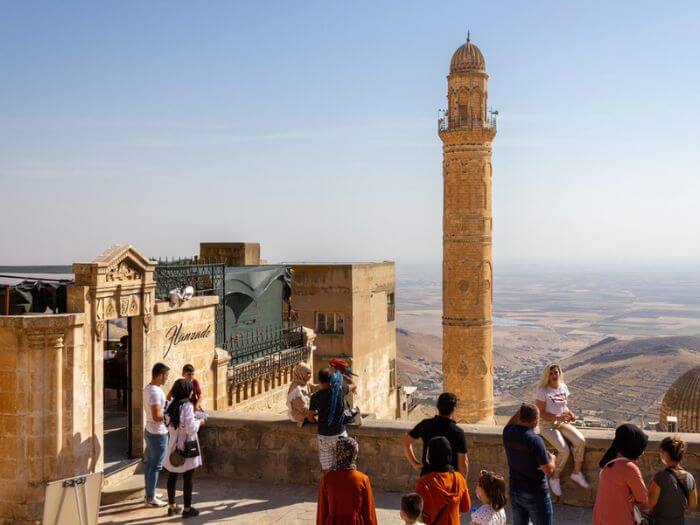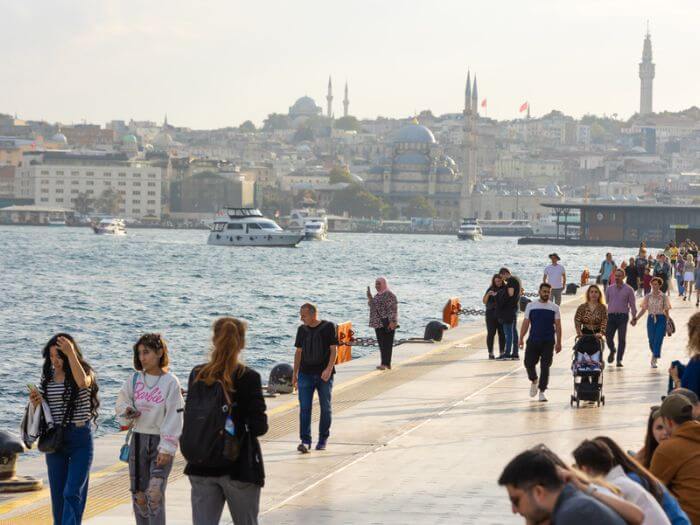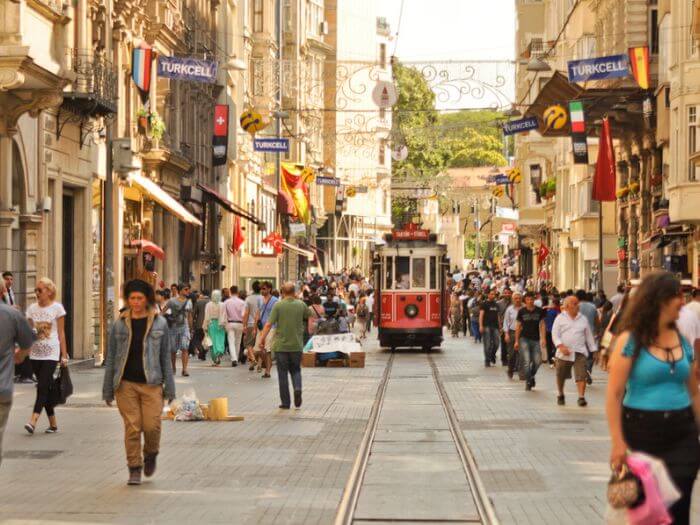When you start learning Turkish, one of the most important things you’ll need to get the hang of is how to use Turkish adjectives.
But what is an adjective? An adjective is any word that helps describe the attributes of a noun, whether that be people, places, things, or even situations or feelings.
Words like “blue”, “big”, “sparkling”, and “sour” are all examples of adjectives, because they can help you give a better picture of how a person, place, or thing might appeal to your senses. For example:
- blue carpet
- big dog
- beautiful eyes
- sour lemon
Adjectives are one of the main building blocks for speaking any language, so you need to know a wide variety of Turkish adjectives.
Here's a list of 78 adjectives that you can use in any conversation in Turkish with an example of how you can use each one in a sentence. Let's get into it.
Pro Tip
By the way, if you want to learn Turkish fast, my top recommendation is Turkish Uncovered. It’s a course where you can adopt the unique StoryLearning® approach to learn Turkish through stories, and not through rules or drills. It’s fun, easy, and effective!
If you’re ready to get started, click here for a 7-day FREE trial.
Table of Contents
How Do Adjectives Work In Turkish?

Before getting into Turkish adjectives themselves, it’s worth understanding first how they work in speech.
Fortunately, you’re in luck because using adjectives in Turkish is almost the same as English. All you do is add the adjective before the noun you are describing.
If you take the examples of adjectives I shared earlier in English, for example, here’s how they sound in Turkish:
- mavi halı (blue carpet)
- büyük köpek (big dog)
- güzel gözler (beautiful eyes)
- acı limon (sour lemon)
Say you want to say “a blue carpet” or “a big dog, and not just “blue carpet” or “big dog”. If you want to add an indefinite article to the adjective in Turkish, you can either add bir (a/an) before the adjective and noun, or between the adjective and noun that it is describing.
In other words:
- bir (a/an) + adjective + noun; OR
- adjective + bir (a/an)
In practice, this can look like:
- mavi bir halı (a blue carpet)
- bir büyük köpek (a big dog)
Note that the word bir is also used for the Turkish number “one”, and that this is the same word for “a/an” in English.
When you want to describe a noun using an adjective in a sentence, then you would simply switch the order and say the noun before the adjective.
You can also add the -dir/-dır/-dur/-dür/-tir/-tır/-tur/-tür suffix after the adjective when you want to make a sentence, but it’s not required.
Here’s a simple formula:
- noun + adjective + –DIR suffix (optional)
For example, Halı mavi and Halı mavidir (The carpet is blue) are both correct and mean the same thing.
Another thing to keep in mind when using Turkish adjectives in a sentence is that the rules for using pronoun suffixes for making sentences without verbs still apply for the Turkish pronouns ben (I), sen (you), biz (we), siz (you [plural]), and onlar (they).
Simply put:
- pronoun or noun + adjective + pronoun suffix (if necessary)
| Pronoun | Pronoun Suffix | İyi (good/well) | Çalışkan (hard-working/studious) |
| Ben (I) | -(y)ım/-im/-um/-üm | Ben iyiyim (I’m good) | Ben çalışkanım (I’m hard-working) |
| Sen (you) | –sın/-sin/-sun/-sün | Sen iyisin (You’re good) | Sen çalışkansın (You’re hard-working) |
| O (he/she/it) | – | O iyi (He/she/it’s good) Annem iyi (My mum is well) | O çalışkan (He/she/it’s hard-working) Annem çalışkan (My mum is hard-working) |
| Biz (we) | -(y)ız/-iz/-uz/-üz | Biz iyiyiz (We’re good) | Biz çalışkanız (We’re hard-working) |
| Siz (you (plural)) | –sınız/-siniz/-sunuz/-sünüz | Siz iyisiniz (You’re good) | Siz çalışkansınız (You’re hard-working) |
| Onlar (they) | –lar/-ler | Onlar iyiler (They’re well) Öğrenciler iyiler (The students are well) | Onlar çalışkanlar (They’re hard-working) Öğrenciler çalışkanlar (The students are hard-working) |
Lastly, languages like English have three degrees of adjectives that are either positive (good, bad), comparative (better, worse), or superlative (best, worst).
While Turkish doesn’t have any degrees of adjectives, you can easily make Turkish adjectives comparative or superlative by adding the words daha or en respectively before the adjective.
| Adjective Degree | İyi (good) | Kötü (bad) | Tatlı (sweet) |
| Positive | İyi (good) | Kötü (bad) | Tatlı (sweet) |
| Daha (Comparative) | Daha iyi (better) | Daha kötü (worse) | Daha tatlı (sweeter) |
| Superlative | En iyi (best) | En kötü (worst) | En tatlı (sweetest) |
So while there are some features that make using Turkish adjectives different from their English counterparts, it’s broadly the same, and perhaps even a bit easier!
78 Essential Adjectives In Turkish

Now that you know how to use Turkish adjectives, let’s get right into learning the most essential adjectives. For each of these adjectives, you can also read an example sentence so that you know exactly how you can use them in daily life.
Descriptive Adjectives
These are Turkish adjectives that describe people, places, and things in the most basic way.
They’re so regularly used that you’ll be sure to want to learn them right away.
1. Güzel (Beautiful, Good, Great)
- Ne güzel bir evin var! (What a nice house you have!)
2. İyi (Good/Well)
- Ailen nasıl, iyi mi? (How’s your family, are they well?)
3. Kötü (Bad)
- Bu yemekler çok kötüymüş, kim yapmış? (This food is really bad, who made it?)
4. Zor (Hard/Difficult)
- Ödevim çok zordu, o yüzden bitiremedim. (My homework was really difficult, that’s why I couldn’t finish it.)
5. Kolay (Easy)
- Doktor olmak kolay bir iş değil. (Being a doctor is not an easy job.)
6. Yumuşak (Soft)
- Bu yastık yumuşak mı? (Is this pillow soft?)
7. Sert (Hard/Harsh)
- Masanın yüzeyi genelde sert olur. (A table top is generally hard.)
8. Temiz (Clean)
- Çocuk temiz bir gömlek giydi. (The child put on a clean shirt.)
9. Kirli (Dirty)
- Bu kirli kıyafetle dışarıya çıkamazsın. (You can’t go out with these dirty clothes).
10. Hafif (Light)
- Bebeğin uykusu hafif olduğu için en küçük sesten uyanıyordu. (The baby would wake up at the smallest sound because he slept lightly.)
11. Ağır (Heavy)
- Bu çanta çok ağırmış, içine ne koydun? (This bag is really heavy, what did you put inside?)
12. Ucuz (Cheap)
- Yeni aldığım halı çok ucuzdu. (The new carpet I bought was very cheap.)
13. Pahalı (Expensive)
- Pahalı eşyaları sürekli alırsan iflas edersin. (You’ll go bankrupt if you keep buying expensive things.)
14. Komik (Funny)
- Kardeşim çok komik biri olduğunu düşünüyorum. (I think my brother is a very funny person.)
15. Çirkin (Ugly)
- Akşam uyumadan önce çocuk “Çirkin Ördek Yavrusu” hikayesini dinledi. (The child listened to “The Ugly Duckling” before going to sleep.)
16. Güçlü (Strong)
- O güreşçi çok güçlü. (That wrestler is very strong.)
17. Zayıf (Weak/Thin)
- Ablam benden daha zayıf, ben biraz daha kiloluyum. (My sister is skinnier than me, I’m a bit heavier.)
18. İlginç (Interesting)
- Şu anda okuduğum kitap çok ilginç, sen de okumalısın. (The book I’m reading now is very interesting, you should read it too.)
19. Korkunç (Scary)
- Otobanda korkunç bir kaza olmuş. (There was a scary accident on the highway.)
20. Düzenli (Clean/Orderly/Organized)
- Masayı düzenli tutmayı tercih ediyorum. (I like to keep my desk organized.)
21. Dağınık (Messy)
- Dağınık ortamlar beni daraltıyor. (Messy environments/settings constrain me.)
22. Boş (Empty)
- Bardağın yarısı boş mu yoksa yarısı dolu mu? (Is the glass half empty or half full?)
23. Dolu (Full)
- Otobüs dolu olmasına rağmen yolcu almaya devam etti. (The bus continued to take passengers even though it was full.)
24. Eski (Old)
- Eski arabamı sattım. (I sold my old car.)
25. Yeni (New)
- Ev taşınırken yeni buzdolabı aldım. (I bought a new refrigerator when I moved house.)
26. Rahat (Comfortable)
- Bu koltuk çok rahat, nereden aldın? (This couch is very comfortable, where did you buy it?)
Adjectives To Describe The Weather And Temperature

These are all essential Turkish adjectives for describing the weather, but you can also use some to describe people and things.
27. Sıcak (Hot)
- Hava sıcak olduğu için durduğum yerde terliyorum. (The weather’s so hot that I’m sweating in place.)
28. Soğuk (Cold)
- Müdürüm çok soğuk biri. (My director is a very cold person.)
29. Ilık (Warm)
- Ilık su alabilir miyim? (Can I get water at room temperature?)
30. Serin (Cool)
- Dışarı içeriye göre serin. (Outside is cooler than inside.)
31. Güneşli (Sunny)
- Yarın güneşli olursa dışarıya çıkabiliriz. (If tomorrow is sunny we can go outside.)
32. Yağmurlu (Rainy)
- Bu etkinliği yağmurlu günler için saklıyorum. (I’m saving this activity for rainy days.)
Adjectives For Emotions And Feelings

Whether you’re speaking with a friend or a neighbour, these Turkish adjectives are bound to come in handy for describing how you’re feeling in the moment.
33. Mutlu (Happy)
- Sen mutlu musun? (Are you happy?)
34. Kızgın (Angry)
- Kızgın olduğum için hiç kimseyle görüşmek istemiyorum. (I don’t want to meet with anybody because I’m angry.)
35. Üzgün (Sad)
- Arkadaşım kedisini kaybettiği için çok üzgün. (My friend is very sad because she lost her cat.)
36. Yorgun (Tired)
- Bugün çok yorgun hissediyorum. (I’m feeling very tired today.)
37. Yalnız (Lonely)
- Yalnız hissettiğinde ne yaparsın? (What do you do when you feel lonely?)
38. Hasta (Sick/Ill)
- Dedem şu an hasta olduğu için çok endişeleniyorum. (I’m worried about my grandpa because he’s sick at the moment.)
Adjectives For Measurements
These Turkish adjectives all help describe sizes, shapes, and distances, so they’re sure to come up in conversation.
39. Büyük (Big)
- Sence hangi ev daha büyük? (Which house do you think is bigger?)
40. Küçük (Small)
- Fare aslandan küçüktür. (Mice are smaller than lions.)
41. Uzun (Long/Tall)
- Uzun boylu adam senin eşin mi? (Is the tall man your husband?)
42. Kısa (Short)
- Saçımı kısa kestirmek istiyorum. (I want to cut my hair short.)
43. Kocaman (Large/Huge)
- Yolda kocaman bir ayı gördük! (We saw a big bear on the road!)
44. Ufak (Tiny)
- Bahçede ufak bir kilpi gördüm. (I saw a tiny hedgehog in the garden.)
45. Düşük (Low)
- Futbol takımın morali çok düşük. (The morale on the football team is low.)
46. Yüksek (High)
- Dünyadaki en yüksek noktası Everest Dağın zirvesindedir. (The highest point in the world is on the summit of Mt. Everest.)
47. Geniş (Wide)
- Yol geniş olduğu için arabayı rahat sürebildim. (I was able to drive smoothly because the road was wide.)
48. Dar (Narrow)
- İstanbul’un dar sokaklarını gezmeyi seviyorum. (I like exploring the narrow streets of Istanbul.)
Adjectives To Describe A Person

These adjectives are bound to come in useful if you’re looking for words to describe the people around you. Check out these personality descriptors in Turkish.
49. Akıllı (Smart/Intelligent)
- Okulda yüksek puan almak akıllı olmakla aynı değil. (Getting high marks in school is not the same as being smart.)
50. Aptal (Stupid/Dumb)
- Aptal bir gülüşle yüzüme baktı. (He looked at me with a stupid smile.)
51. Nazik (Kind)
- Ne kadar nazik birisin. (What a kind person you are.)
52. Kibar (Polite)
- Yaşlılara karşı kibar olmamız lazım. (We need to be polite towards the elderly.)
53. Kaba (Rude)
- Hayatımda kaba insanlardan hep kaçmaya çalışıyorum. (I try to avoid rude people in my life.)
54. Dürüst (Honest)
- Dürüst olmam gerekirse bu yemeği çok sevmedim. (If I need to be honest, I didn’t enjoy this food very much.)
55. Gururlu (Proud)
- Amcam gururlu biri olduğu için yanlış yaptığını kabul edemiyor. (My uncle can’t accept that he did anything wrong because he is a proud person.)
56. Utangaç (Shy)
- Çocuklar bazen yeni ortamda utangaç olabilirler. (Children can sometimes be shy in new environments.)
57. Çalışkan (Hard-working/Studious)
- Çalışkan olmak akıllı olmaktan daha önemli. (Being hard-working is more important than being smart.)
58. Zengin (Rich)
- Adam çok zengin olduğu için kendi uçağıyla dünyayı geziyor. (The man is so rich that he’s travelling the world with his own plane.)
59. Fakir (Poor)
- Enflasyon herkesi daha fakirleştirdi. (Inflation made everyone poorer.)
60. Ünlü (Famous)
- Çocuk hayalım ünlü bir şarkıcı olmaktı. (My childhood dream was to be a famous singer.)
61. Sağlıklı (Healthy)
- Sağlıklı bir hayat yaşamak için doğru beslenmek lazım. (One must eat well to live a healthy life.
62. Tembel (Lazy)
- Kız kardeşim çok tembel olduğu için odasından çıkmadı. (My sister didn’t leave her room because she’s very lazy.)
63. Şişman (Fat)
- Kedim sağlıksız beslendiği için çok şişman. (My cat is very fat because it doesn’t eat healthy.)
64. Genç (Young)
- Bilim adamları genç kalma yollarını bulmaya çalışıyorlar. (Scientists are trying to find ways for people to stay young.)
65.Yaşlı (Old/Elderly)
- Yaşlılara karşı saygı göstermemiz lazım. (We need to show respect towards the elderly.)
Adjectives To Describe Tastes
Given how much food is an important part of Turkish culture, it’s worth learning these Turkish adjectives to describe all the food you’ll be eating!
66. Lezzetli (Delicious)
- Türk yemekleri çok lezzetlidir. (Turkish food is very delicious.)
67. Tatlı (Sweet)
- Baklavalar çok tatlı. (Baklava is very sweet.)
68. Tuzlu (Salty)
- Fazla tuzlu yemek yemek sağlığa zararlıdır. (Eating food that is too salty is not good for your health.)
69. Ekşi (Sour)
- Limon ekşidir. (Lemons are sour.)
70. Acı/Acılı (Bitter/Spicy)
- Adana kebap acılı yenir. (Adana kebap is eaten spicy.)
71. Sade (Plain)
- Benim kahvem sade olsun. (Make my coffee without sugar/black.)

Colour Adjectives In Turkish
Last but not least, colours are also a type of adjective that can help you describe the places and things around you. Here are some colours in Turkish to name a few:
72. Kırmızı (Red)
- Kırmızı balık gölde. (The red fish is in the lake.)
73. Mavi (Blue)
- Babamın gözleri mavi. (My dad’s eyes are blue.)
74. Yeşil (Green)
- Bursa şehrine “Yeşil Bursa” derler. (They call Bursa the city “Green Bursa”.)
75. Sarı (Yellow)
- Oradaki sarı bina okulum. (The yellow building over there is my school.)
76. Siyah (Black)
- Siyah pantolonum yırtıldı. (My black pants were torn.)
77. Beyaz (White)
- Beyaz ışık gözleri yorabilir. (White light can tire out eyes.)
78. Kahverengi (Brown)
- Ağaçların kabukları kahverengi olur. (Tree bark is brown.)
Turkish Adjectives FAQ
How do you use adjectives in Turkish?
In Turkish, adjectives come before the noun they describe, just like in English. For example, büyük ev means “big house.”
Turkish adjectives don't change based on gender or number. However, when used as predicates (e.g., “The house is big”), they follow the subject + adjective + dir (optional) structure: Ev büyük(tür).
Start Using Turkish Adjectives Today!
And with that said, that’s my list of 78 Turkish adjectives that you can use at any time of day!
All of these adjectives will help you speak Turkish more fluently and sound like a native speaker.
Because all of these adjectives are common, you can expect to hear and read them all the time. So be sure to keep your ears open for them as you read books in Turkish or listen to Turkish podcasts.
And if you’re looking for a way to expose yourself to these adjectives on a regular basis, you can sign up for Turkish Uncovered!
It’s a Turkish course that teaches you using the unique StoryLearning® approach where you learn through story, not rules. It’s as fun as it’s effective. Check it out today by clicking here for a 7-day FREE trial!

Olly Richards
Creator of the StoryLearning® Method
Olly Richards is a renowned polyglot and language learning expert with over 15 years of experience teaching millions through his innovative StoryLearning® method. He is the creator of StoryLearning, one of the world's largest language learning blogs with 500,000+ monthly readers.
Olly has authored 30+ language learning books and courses, including the bestselling "Short Stories" series published by Teach Yourself.
When not developing new teaching methods, Richards practices what he preaches—he speaks 8 languages fluently and continues learning new ones through his own methodology.










































